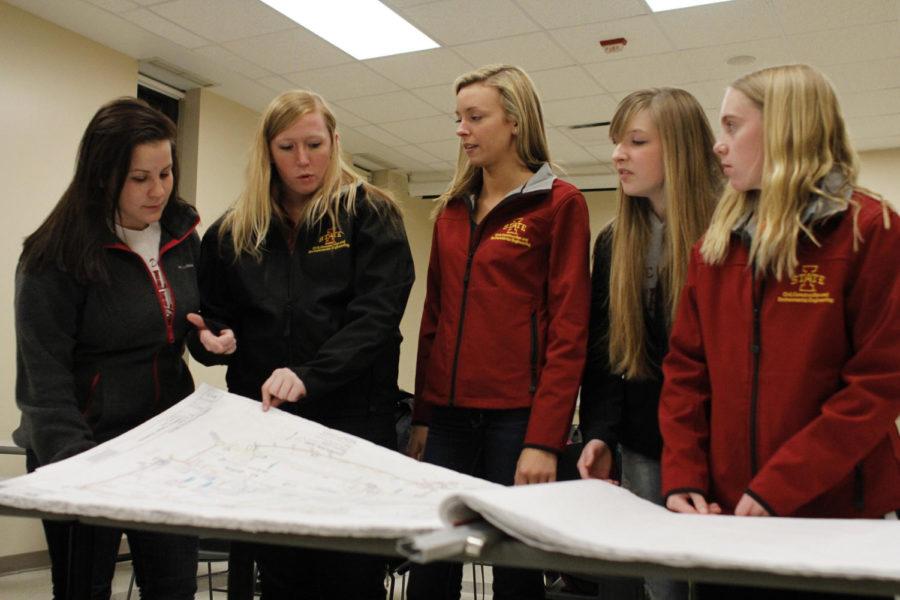Micro-aggressions still present in CALS
Rebecca Dailey, president, recruited for a new club on campus that is open exclusively for women in engineering, Civil Ladies in Engineering. The club helps women connect and network with professionals in the fields and secure jobs once graduation comes.
April 11, 2017
Women are still experiencing small acts of discrimination, even in fields where there are more women than men, according to some students and faculty.
These small actions of discrimination, also known as micro-aggressions, are subtle actions a particular group of people get from others that would be considered discriminatory.
The faculty within the Department of Agricultural and Biosystems Engineering still see that trend in the students who enroll within the department.
Women sign up for Biological Systems Engineering more than any other major in the department. However, they still see these negative stereotypes placed upon women that can lower their self-esteem.
For the spring 2017 semester, there are 790 students in the Agricultural and Biosystems Engineering department, according to Iowa State University enrollment records. Of that number, 105 of them identify as female, and 45 of them are enrolled as a biological systems major.
Biological systems engineers create biologically based products from breakfast cereals to ethanol found in gasoline. They focus on sustainability, air quality and efficient food supply.
“[Women] tend to have a more natural drive toward helping society,” said Steve Mickelson, chair of the department of agricultural and biosystems engineering. “Nationally, we see more females interested in environmental issues.”
This preference for one specific major leaves women in other majors sometimes without someone who are like them in their classes at Iowa State.
Marianna Overgaard, president of the Biological Systems Engineering Club, said that clubs are where women find other women like them and create tighter bonds.
Clubs also set them up for their male peers to speak about their female peers in a stereotypical manner.
“I often get comments from the guys who say that it’s dangerous for a woman to be a treasurer,” said Jessica Hanrahan, treasurer of the Agricultural Systems Technology Club. “They say ‘be careful giving a woman all of our money, she’ll go out and spend it all.’”
Stereotypes that all women spend money while out shopping or that they are bad at math are common micro-aggressions, even in a major where there are more women than men.
“I didn’t do well in physics,” Overgaard said. “So my adviser questioned my ability to even complete my major.”
Mickelson said that Iowa State has made great progress into hiring a more gender diverse faculty, but equal representation among genders doesn’t lie solely in the hands of colleges and universities.
“Men are typically more hands on,” Mickelson said. “It’s because of society; girls just aren’t playing around with wrenches when they’re young.”
Kurt Rosentrater, adviser for the Biological Systems Engineering Club, said that older generations still tend to hold on to this mindset.
And some women have experienced this generational gap first-hand.
“At career fairs, this guy interviewed me and doubted me,” Hanrahan said. “He tried to push me toward a job that he thought was more suited for a woman.”
However, Overgaard and Hanrahan, as well as hundreds of other women, aren’t allowing societal normalities to hold them back.
Women in Science and Engineering, or WiSE, helps women like them find the resources they need to succeed by offering free tutoring and a mentor for every woman involved according to their website.
However, some women do end up dropping out of science, technology, engineering or math based majors, after being discouraged because their grades start to fall.
Mickelson said that while talking with WiSE faculty, he learned that women who drop out of STEM majors think they are performing horribly compared to their peers.
However, when comparing the GPAs of women and men when they dropped a STEM major, the GPAs of the women were usually higher than men.
Mickelson said that this means women seem to think that failure happens as soon as they believe they aren’t succeeding like their peers.
It’s not just in college either, high school-age girls often experience similar micro-aggressions, which is why Mickelson said the department focuses on getting high school girls interested.
“I would tell young girls… don’t be intimidated,” Hanrahan said. “Yes, you’ll have to work a little harder, but it will be worth it. Trust me, it’s definitely worth it.”







